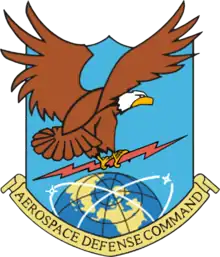34th Air Division
The 34th Air Division (34th AD) is an inactive United States Air Force organization. Its last assignment was with Air Defense Command at Custer Air Force Station, Michigan. It was inactivated on 31 December 1969.
34th Air Division
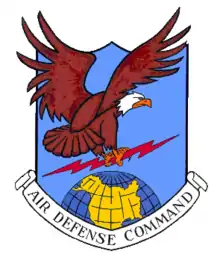 | |
|---|---|
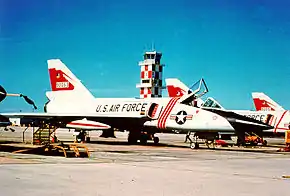 | |
| Active | 1951–1960; 1966–1969 |
| Country | |
| Branch | |
| Role | Command of air defense forces |
| Part of | Air Defense Command |
| Insignia | |
| 34th Air Division emblem (Approved 28 October 1966)[1] | 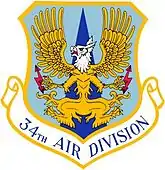 |
History


Assigned to Air Defense Command (ADC) for most of its existence, "from January 1951 until 1960 the 34th administered, trained, operated and supported assigned units, and placed all available combat capable elements in a maximum state of readiness. Initially, its area of responsibility included Arizona, New Mexico, and parts of Nevada, Utah, Colorado, and Texas."[1] It was inactivated and its mission, personnel and equipment were transferred to the Albuquerque Air Defense Sector on 1 January 1960.
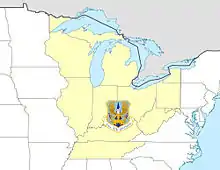
Reactivated on 1 April 1966, to perform Air Defense "including all or part of Michigan, Indiana, Ohio, New York, Pennsylvania, West Virginia, Kentucky]], Tennessee, and Virginia"[1] assuming responsibility for the missions of the Detroit and parts of the Syracuse Air Defense Sectors.
Assumed additional designation of 34th NORAD Region after activation of the NORAD Combat Operations Center at the Cheyenne Mountain Complex, Colorado and reporting was transferred to NORAD from ADC at Ent Air Force Base in April 1966. The division participated in numerous live and simulated exercises such as Fainting Echo, Apache Arrow, and Fainting Knife.[1]
Inactivated in December 1969[1] as ADC phased down its interceptor mission as the chances of a Soviet bomber attack on the United States seemed remote, its mission being consolidated into North American Aerospace Defense Command (NORAD).
Lineage
- Established as the 34 Air Division (Defense) on 1 January 1951
- Activated on 5 January 1951
- Inactivated on 1 February 1952
- Organized on 1 February 1952
- Inactivated on 1 January 1960
- Redesignated 34 Air Division and activated on 20 January 1966
- Organized on 1 April 1966
- Inactivated on 31 December 1969[1]
Assignments
- Western Air Defense Force, 5 January 1951 – 1 February 1952
- Central Air Defense Force, 16 February 1953 – 1 January 1960
- Air Defense Command, 20 January 1966
- First Air Force, 1 April 1966 – 31 December 1969.
Stations
- Kirtland Air Force Base, New Mexico, 5 January 1951 – 1 January 1960
- Custer Air Force Station, Michigan, 1 April 1966 – 31 December 1969[1]
Wing
- 1st Fighter Wing (Air Defense)[1]
- Selfridge Air Force Base, Michigan, 1 April 1966 – 1 December 1969
Interceptor squadrons
|
|
Missile squadron
- 35th Air Defense Missile Squadron (BOMARC)[1]
- Niagara Falls Air Force Missile Site, 15 September-19 November 1969
Radar squadrons
|
|
See also
References
Notes
- "Factsheet 34 Air Division". Air Force Historical Research Agency. 5 October 2007. Archived from the original on 22 October 2012. Retrieved 9 April 2014.
- Aircraft is North American F-86A-5-NA Sabre Serial 48-133 at Kirtland AFB NM Aircraft participating in B-36 intercept tests. The wide color bands were painted on the fuselage for identification as a test aircraft. Taken October 1951.
Bibliography
![]() This article incorporates public domain material from the Air Force Historical Research Agency website http://www.afhra.af.mil/.
This article incorporates public domain material from the Air Force Historical Research Agency website http://www.afhra.af.mil/.
- Cornett, Lloyd H; Johnson, Mildred W (1980). A Handbook of Aerospace Defense Organization, 1946–1980 (PDF). Peterson AFB, CO: Office of History, Aerospace Defense Center. Retrieved 23 March 2012.
- Winkler, David F.; Webster, Julie L (1997). Searching the skies: The legacy of the United States Cold War Defense Radar Program. Champaign, IL: US Army Construction Engineering Research Laboratories. LCCN 97020912.
- "ADCOM's Fighter Interceptor Squadrons". The Interceptor. Aerospace Defense Command. 21 (1): 5–11, 26–31, 40–45, 54–59. January 1979.
